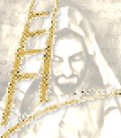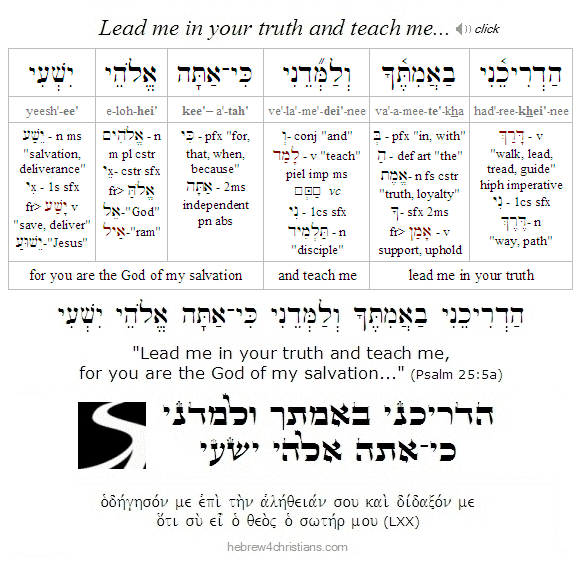
The Ladder of Truth...
by John J. Parsons
www.hebrew4christians.com
The Hebrew idea of "truth" (i.e., emet: אֱמֶת) is richer than factual description or "correspondence" between language and reality, since it contains moral implications and possibilities: what is true is also right, good, reliable (honest), beautiful, and sacred. The Hebrew word comes from a verb (aman) that means to "confirm" or establish, and the noun form (i.e, emunah: אֱמוּנָה, "faithfulness" or "trustworthiness") expresses the will to live by what is ratified, the "amen" of decision. The Hebrew concept is therefore existential: truth that is not lived is not really truth. Speaking the truth (dibbur emet) and abhoring dishonesty are considered foundational to moral life, as it says: "Speak the truth (דַּבְּרוּ אֱמֶת) to one another; render true and perfect justice in your gates" (Zech. 8:16). Yeshua said, "Amen, amen I say to you...." throughout his ministry to stress the reliability and certainty of God's truth (Matt. 5:18, 26, etc.). Indeed, Yeshua is called "the Amen, the faithful and true witness" (Rev. 3:14). In that sense truth is not a "what" of correspondence but rather a "who," since reality turns on the magnetism of the divine presence (Col. 1:16).
The ancient Greek word translated "truth" is aletheia (ἀλήθεια), a compound formed from an alpha prefix (α-) meaning "not," and lethei (λήθη), meaning "forgetfulness." Greek scholars say the word lethei itself derives from the verb lanthano (λανθάνω), which means "to be hidden," so the general idea is that a-letheia (i.e., truth) is non-concealment, non-hiddenness, or (put positively) revelation or disclosure. Thus the word of Yeshua - His message, logos (λόγος), revelation, and presence - is both "unforgettable" and "irrepressible." Yeshua is the Unforgettable One that is manifest as the express Word of God (דְּבַר הָאֱלהִים). He is the Light of the world (אוֹר הָעוֹלָם) who imparts the "light of life" (John 8:12). Though God's message can be supressed by evil and darkened thinking, the truth is regarded as self-evident and full of intuitive validation (see Rom. 1:18-21).
Note that the LXX (i.e., the ancient Greek translation of the Jewish Scriptures commonly called the Septuagint) dates from the time of the philosopher Plato, though of course the Hebrew text dates back to the time of Moses (13th century BC) and even earlier. About 300 BC, "Theophrastus," a student of Aristotle, wrote of the Jews that 'being philosophers by race, they converse with each other about the Divine." Abraham, who dates from about 2,000 BC, was the first avowed monotheist who openly repudiated the polytheism and idolatry of ancient Ugaritic culture (Abraham also long predates the rise of Hinduism and the animistic hymns of the Vedas and their priestly commentary found in the Upanishads by a thousand years, just as ancient Judaism predates "Islam" by thousands of years). Similarly, both David and his son Solomon (10th century BC) wrote "existential" works of philosophy, predating the modern world by nearly 3,000 years...
Hebrew Lesson:
Psalm 25:5 Hebrew Reading:

- Psalm 25:5a Hebrew page (pdf)


Related Discussion:
- The Gospel in the Garden
- The Seed of Abraham
- Melchizedek and the Messiah
- The Sacrificed Seed (the Akedah)
- The Passion of Isaac
- The Akedah of Sarah
- The Temptation of Grace
- Midrash of the White Ram
- The Seed of Isaac (Jacob)
- Israel and the Akedah
- Jacob's Dream of the Messiah
- The Promise of Shiloh (Messiah of Judah)
- The Gospel According to Moses
- Prophet Like Moses
- Passover and the Gospel
- Rosh Hashanah
- Yom Kippur and the Gospel
- Rabbis who deny Blood Atonement
- The High Holidays and the Gospel
- Names of God: Messiah
- The Akedah Prayer
- Jewish Philosophy of History
- The Imminence of Redemption
Hebrew for Christians
Copyright © John J. Parsons
All rights reserved.